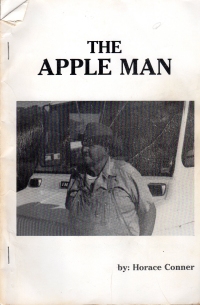 This is a fascinating book, especially on the meta level.
This is a fascinating book, especially on the meta level.
It is the autobiography of Horace Conner, born in 1919. Here’s how he puts it in the first lines of the book:
I was born on May 15, 1912 in Cotton County, Oklahoma, the southern part of Oklahoma on the Little Red River. I was the second child. The year I was born my father’s house was blown away in a cyclone.
And we’re off.
The book chronicles, in some order, his youth in a large, blended family; his businesses throughout the Depression with his father, particularly working on farms and orchards; his drafting into World War II and his service in the Navy and in post-surrender Japan; then his return to the United States, his failed marriage, his carousing and carrying on with women; and then his jobs after the war, including time in a produce market and a distribution center for Marshall Fields in Kansas City.
It’s a life of some dude who didn’t do particularly heroic things or live a particularly memorable life. But the voice is complex and engaging, or maybe I’m reading too much into it.
He’s humble, saying he wasn’t very good at writing at school, but here he’s written the book. He does a lot of humble bragging, where he does something and throws in that someone who saw him do it thinks he’s the best they’ve ever seen at it; I’m not sure if he is actually humblebragging because he’s good at it and wants affirmation of it or if he’s throwing it in to say it’s because he’s showing us he is too good at something. Some of the things he’s done that are less than heroic are just dropped in, like selling stuff from the Navy on the black market. But he also throws in stuff that he does that’s all right, like feeding Japanese war orphans from the back of his ship. He admits that he’s a bit of a carouser and not good relationship material, but that’s matter-of-fact and he doesn’t regret it or think it’s immoral or counterproductive. He goes out of town on a pleasure trip and ends up missing a day of work, and the excuse he gives his boss is that he was in jail in Sedalia. That’s his best excuse. And the manager buys it and keeps him on. What does that say outside the text of the book?
Most tellingly, he mentions that he wanted to have children and that he enjoyed time with his stepson while he was married, but he leaves no admitted progeny. He talks about retiring and picking up his small entrepreneurial ways, delivering some produce and selling it from his trucks. But he doesn’t much mention church–although he claims to read the Bible, particularly Proverbs. And he talks a little about his methodology of research at the library to make sure he gets his dates right in the book.
But he never explains why he wrote the book.
It’s not for his kids. Perhaps his nieces and nephews? I don’t know. For someone who claimed to not be a good writer, he didn’t do badly. But why did he do it? The writing of this book does not necessarily jibe with the simple man described within it.
As I said, on the meta level, it’s fascinating. And it wasn’t a bad read (better than An Ozark Boy’s Story for example) but there’s no real climactic payoff. After all, this is the life of a man. Also, gentle reader, it’s apparently $125 on the Internet, so you’ll probably not pick it up.
Books mentioned in this review:


